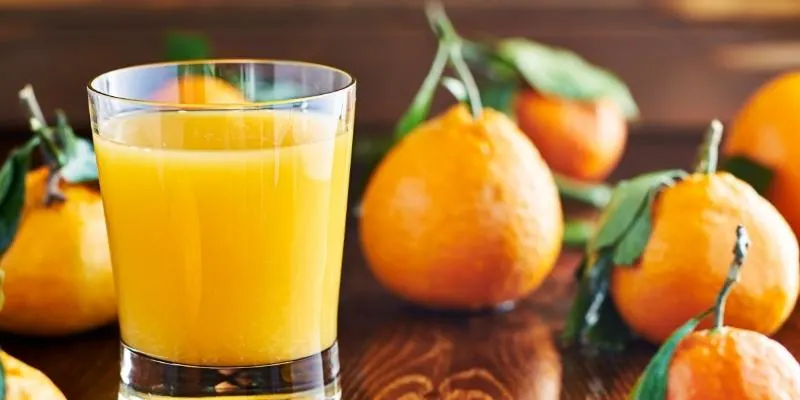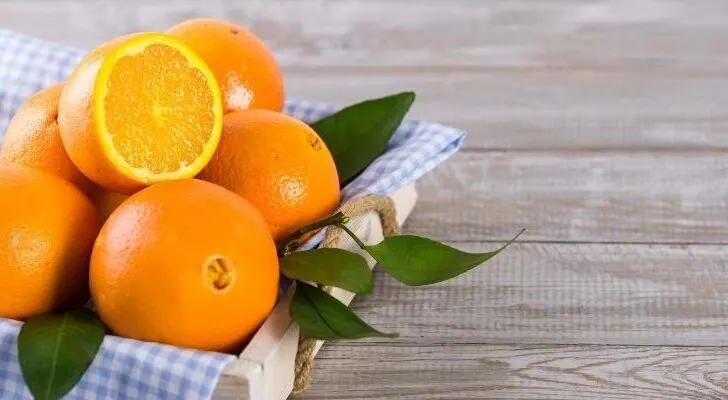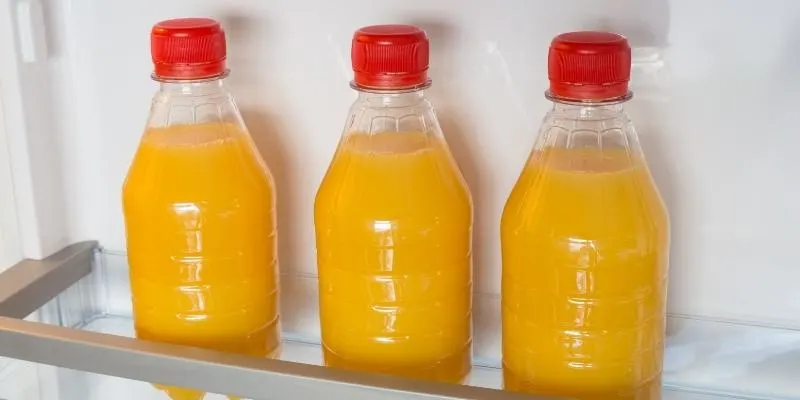Bitter orange juice is the bane of anyone’s morning, and really not what you’re looking forward to when you sit down for a nice brunch. So why is orange juice bitter ? Is there anything you can do about it ? Does it matter if it’s fresh or from a carton ? Does it matter what oranges you’re using ? And why is it so unbearably bitter after you brush your teeth ? Let’s find out.

Why is orange juice bitter ?
Freshly squeezed orange juice can turn bitter in about 30 minutes, if made from navel oranges, which are the most common oranges sold in grocery shops. These contain higher amounts of limonin, a bitter compound common in citrus, and it activates after exposure to oxygen. Pasteurized orange juice (in a carton) tastes a bit bitter due to being heated, which destroys a lot of the flavor. The juice then has aroma added back in.
Now that’s a lot to unpack, so let’s take it step by step, starting with limonin, what it is, why it’s in your oranges, and whether there’s anything you can do about it.
Limonin turns citrus bitter
Limonin is a compound that is bitter, and its main role is not very well understood. It’s still listed as a phytochemical, which is science for ‘not 100% what it does’. Limonin is easily found in several plant types, but is found in citrus fruits in the highest amounts. Grapefruits store limonin in their thin skin and pith, and that is why they’re so bitter. Removing the pith and skin greatly improves the flavor. The same goes for pomelo and blood oranges.
Most of the time you’ll fine limonin in seeds, pith, and skins. And navel oranges have the highest amount of limonin out of all commercial oranges. If your orange juice is made at home, you still have time to make and drink your orange juice in 30 minutes.
If it’s commercially made orange juice, it’s gone through a long process of squeezing, filtering, heating, dehydrating, rehydrating, adding flavor, and so on. The bitterness resulting from this, added to the bitterness from limonin does not make a great tasting orange juice, without the aid of a lot of sugar.
Read also: How Long Does Cranberry Sauce Last ?
Some oranges make bitter juice, some don’t
Let’s talk oranges for a bit. What oranges you use for your orange juice really matters, since not all oranges are the same. Some are meant for eating, such as the navel oranges, and some are meant for juicing, such as Valencia. Some have seeds, some don’t. Some have better flavor, some are just larger.
If you’re buying your oranges form your local grocery store or farmer’s market, you’re likely buying navel oranges. They’re called that because one of their ends is kind of open, resembling a human belly button. They look like that because that end actually has another tiny orange growing inside of it.

Navel oranges are the worst offender when it comes to bitterness in juice. They are seedless and sweet, and their juice is great if consumed immediately after pressing(less than 30 minutes). If you’re home and making your own, you might just have enough time. And if you’re buying OJ that’s freshly pressed right in front of you, you still have time. Anything else is a guessing game.
For this reason navel oranges are best consumed out of hand, since the limonin doesn’t have time to react with the oxygen. It takes about a half hour of continuous oxygen exposure to develop its bitterness, and when you eat the oranges it doesn’t have time to do that.
So what oranges are safer for juice ?
Valencia oranges. Those are plumper and much juicier, and don’t have an end that looks like a navel, and may or may not have the occasional green spot. If navel oranges are common in the cold season, Valencia are common in the warm season.
And if you’re trying to avoid bitterness in your OJ, stay away from grapefruit and blood oranges, since these are also bitter. Unless you take the time to peel the thin white skin off (very time consuming).
Can you make orange juice less bitter ?
The only way to make orange juice less bitter is by masking it with sugar, which is a personal decision. It doesn’t remove the bitterness, it just masks it behind a layer of sweetness.
So if you’ve got fresh navel orange juice, you can avoid the bitterness by consuming it within 30 minutes of squeezing, or you can sweeten it. Other than that, there is nothing you can do safely at home.
Read also: Why Is Pomelo Bitter ? How To Tell If Pomelo Is Bad
Fresh vs pasteurized orange juice
As you’ve noticed there’s quite a big difference between pasteurized and fresh orange juice, and we’ll explain why. First we need to talk about what is pasteurization and why orange juice is subjected to that in the first place.
Pasteurization is the process of heating a food item (usually liquid) to near boiling point and keeping it there for a couple of seconds. This is done to inhibit kill of bacteria and fungal spores that will eventually spoil the item, and in some foods or deactivates some enzymes that are responsible for breaking down (fermenting) the product.
So, in essence pasteurization is done to sterilize and keep the food item shelf-stable for longer. All of this is lost if the food item isn’t kept in sealed, sterile containers, hence why it can last for months in its carton, but once you open it you’ve got about a week.
The issue with pasteurization is it changes the flavor a bit, and for orange juice the flavor is key. This is why pasteurized orange juice is then re-flavored, and why the taste can get a bit bitter sometimes.
Fresh orange juice is, well, fresh and you know what’s in it if you’re the one making it or watching someone make it. But it doesn’t last long. Freshly-made orange juice that is immediately bottled can last a grand total of about 7 days before it starts to ferment. I recommend keeping this in your fridge at all times, and never drink directly out of the bottle (you transfer bacteria).
Read also: Continental VS American VS English Breakfast
So can you make orange juice the night before ?
Yes, you can make orange juice the night before, store it in several smaller bottles, and keep them all in the fridge. They should be fine for up to 1 week if the bottles are closed tight and you don’t drink from all of them at once. We can’t guarantee the juice won’t go bitter if you’re using navel oranges, since there is still air exposure. Maybe it’s best to use a different type of orange.

Why is orange juice bitter after brushing teeth ?
Orange juice can taste bitter after brushing your teeth because of your toothpaste. It contains SLS (sodium laureth sulfate) which is meant to help lather and spread the toothpaste around your mouth. SLS can make anything taste odd, even your morning coffee or breakfast. You won’t taste the sweetness in anything, immediately after brushing your teeth.
Fortunately this effect goes away you need more saliva, to rinse out the SLS. This effect goes away on tis own anyway in about an hour, but you can speed it up by chewing non-menthol and sugar-free gum, eating something, or by just braving the initial flavor of post-teeth-brushing OJ.
Another option is to use SLS-free toothpaste. It won’t foam but it will get the job done, as long as you’re making sure to clean all of your teeth.
So in short, it’s not that your orange juice went bad. It’s just that the SLS is masking the sweetness and only showing you the bitterness. NOt fun, I know, but it’s really just temporary.

